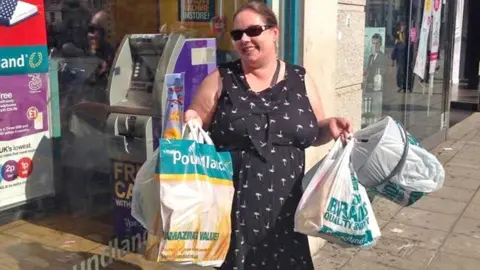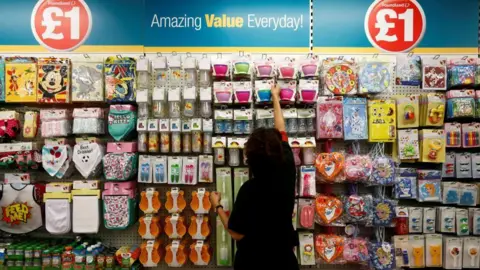'I used to spend £50 there': What's gone wrong at Poundland?
 Sharon Carroll
Sharon CarrollSharon Carroll once shopped so much at her local Poundland that her friends described her as "Mrs Poundland".
"I'd just buy so many things," says Sharon. "I'd spend £40 to £50.
"When everything used to be £1 it was a big attraction."
But when the company began to change its pricing strategy, increasing the prices of some products from £1, the 45-year-old says she cut down on her purchases.
"The quality of the products was also going down and you were paying more for things."
Other shoppers also told the BBC that they were put off when the retailer started putting its prices up.
This week, the struggling budget chain was sold for (appropriately) £1 by its owner Pepco to a US investment firm, Gordon Brothers. Up to 100 stores are at risk of closure.
The £1 promise was Poundland's "most compelling proposition", says Howard Lake, a retail consultant at Kantar.
"Removing this identity alienated its core shopper base."
The company clearly agreed. After it raised some prices from £1 in 2017, earlier this year it said it was returning to its roots, increasing the number of products it offered that cost £1 or less from 1,500 to 2,400, almost half its range.
Small towns
Poundland has 825 stores in the UK, with around 16,000 staff.
Many of those shops are former Woolworths or Wilko branches, which it hoovered up after the two brands collapsed.
Poundland became the biggest occupant of ex-Woolworths stores after the retailer went into administration in 2009, taking on 93 of its stores, more than 10% of the Woolworths estate. In September 2023 it took over the leases of 71 former Wilko stores.
Often, these stores were in the kinds of small towns where other large retailers do not have a presence.
"They might have had a Woolworths, a bank and a charity shop," says Jonathan de Mello, a retail analyst and the founder of JDM Retail.
Elizabeth Gray loves going into her local Poundland in Bangor, Northern Ireland.
Recently, she found a pair of small ceramic houses in the store, which were a copy of a design she had seen at Zara. "We don't have a Zara near where I live," she says.
 Elizabeth Gray
Elizabeth GrayPoundland's presence in small towns has been crucial to fostering a sense of customer loyalty, says retail psychologist Kate Nightingale.
"Simply being present in people's daily rituals is one of the strongest ways to build interdependence.
"Presence plus reliance are some of the most important qualities of loyal relationships and it is no different to relationships we build with brands."
But de Mello says when Poundland expanded into small towns, not enough people went in, which hit their bottom line.
"In the small locations that they've opened multiple stores in, I feel the volumes aren't there in terms of footfall, unfortunately."
Increased competition
In 2016 Poundland expanded into fashion, beginning the roll-out of its Pep&Co clothing range, but this soon faced problems.
In a trading update in May 2024, the company admitted that changes to the way it sourced clothing had reduced the number of sizes on offer.
 Reuters
ReutersWhile the wide range of products stocked by Poundland may have been handy for consumers, it became a problem for the brand.
It stocked so many different products – from food to clothing, to homewares and baby products – that it became, says Kantar's Howard Lake, a "supermarket-general store hybrid".
That made it vulnerable to competition from numerous other brands.
On the food side, there are Aldi and Lidl, whose UK presence has grown rapidly in recent years. On the homewares side are Home Bargains and B&M. And on the clothing side are Shein and Temu, the cheap Chinese exporters which have enjoyed a surge in popularity among British shoppers.
Ultimately, says Lake, consumers found these other offers "far more attractive".
Poundland told the BBC: "Our missteps have been well documented and those include the execution of Pepco-sourced clothing and general merchandise product ranges in a way that didn't fully align with UK & Ireland customers' expectations.
"We're looking forward to having the opportunity to put those missteps right as we put our recovery plan in place."
Shoppers like Elinor Martin in Sutton Coldfield hope the company succeeds.
She uses Poundland to pick up snacks for her sons' packed lunches, stationery and birthday cards for school, plus shampoo, shower gel and cleaning products.
She says she would miss her local branch if it were to close. "I can get things I need at Poundland. I find things cheaper there [than local supermarkets]."
Elizabeth Gray in Bangor says she would miss her local store too if it went.
"I would be sad if it closed," she says. "I'm kind of in love with Poundland."
Additional reporting by Tom Espiner
